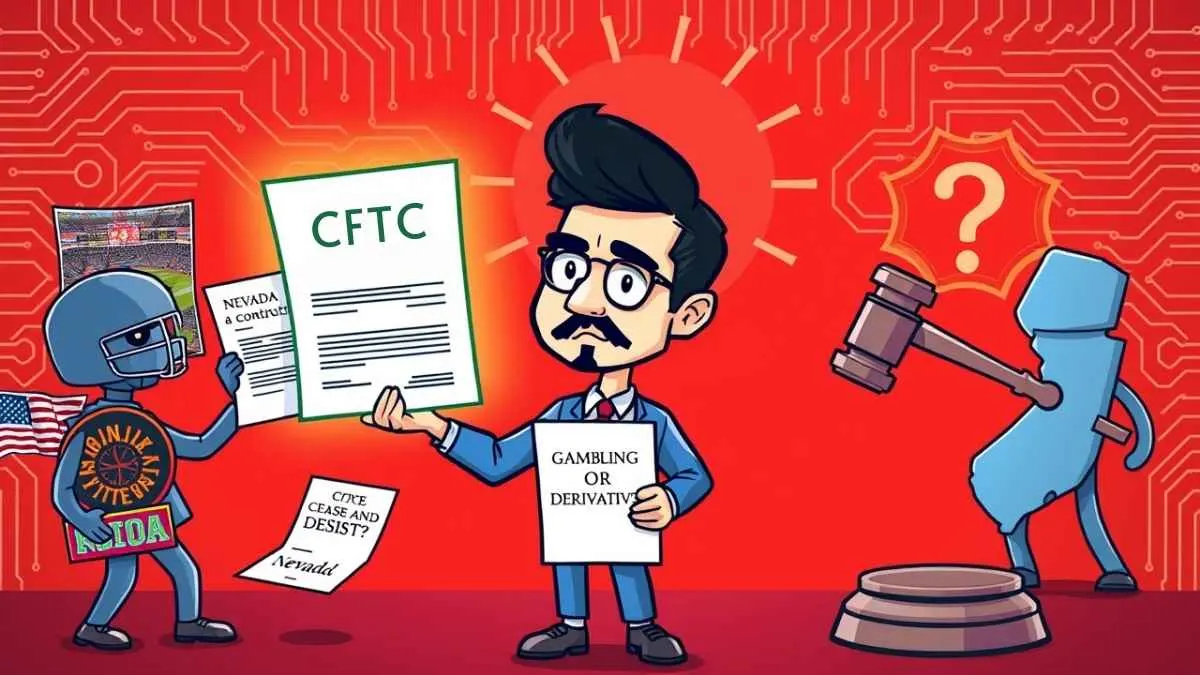Kalshi filed litigation against Nevada and New Jersey after these states issued prohibitive orders to block their sports contract activities.
Kalshi leads the front as an innovator in prediction market development. The operating platform Kalshi took legal action against New Jersey and Nevada gambling agencies by filing court cases on March 29, 2025, after receiving their cease-and-desist orders about sports contracts. The core fight? Kalshi seeks legal clarification regarding the reach of state gambling laws against event-based contracts that the CFTC regulates. The debate between state authorities and the crypto and prediction market spheres about regulatory boundaries can potentially transform federal-state relations.
The Regulators’ Move: Cease and Desist
The Gaming Control Board in Nevada began its assault on March 4 when it forced Kalshi to stop its “event-based contracts” by setting a deadline of March 14, along with an extended enforcement date. Their beef? According to Nevada statutes NRS 463.160(1)(a) and NRS 463.245(2), the GCB declared that Kalshi operates without a necessary sports betting license. The regulators insist that the contracts that allow users to bet on sports results or election outcomes should be considered gambling activities, as state-licensed operators are the only entities authorized to wager. Along with his warning, Chairman Kirk Hendrick reinforced the risky implications that violate Nevada’s gambling regulations.
New Jersey’s Division of Gaming Enforcement maintained the same position through its letter released on March 27. The written notice from New Jersey stated that the sports betting contracts on Kalshi interfere with the state’s Sports Wagering Act since only approved operators can provide such services. The state prohibits college sports betting involving New Jersey-area teams or matchups, regardless of the situation. Kalshi’s platform functions as an illegal sportsbook according to the views of both states.
Kalshi’s Counterpunch: Federal Law Rules
Kalshi isn’t backing down. Kalshi has initiated two lawsuits against the Nevada GCB and New Jersey DGE, which state that its commodity contracts involving yes or no betting on Super Bowl winners and election results come under CFTC federal oversight rather than state gambling jurisdiction. Kashli’s court documents argue that the Commodity Exchange Act supersedes state legislation, thereby calling New Jersey’s action an unwanted incursion against the established federal commodities market system established since the 1980s.
CEO Tarek Mansour shows great enthusiasm. The CFTC’s statutory authority suffers damage not just to Kalshi contracts but also due to these state actions, according to Taliski’s CEO, in his official statement. Prediction markets exist as a contemporary discovery many people fail to comprehend correctly. We have secured victories in previous battles, and this battle follows exactly the same path. Kalshi seeks to explain that its platform is not a traditional casino establishment. Users on the platform execute legitimate swap deals instead of making random bets, thus hedging their financial risks. The lawsuits strongly argue that states have no jurisdiction to interfere with products accepted by the CFTC.
Gambling or Derivatives? The Big Question
Here’s where it gets juicy. GCB Nevada proclaimed that payments in Kalshi depend on outside occurrences rather than user conduct, which means they fall under gambling rules, according to their assessment. The DGE of New Jersey supports this assessment by stating that Kalshi violates its prohibition against university sports gambling. Kalshi bases its argument on federal law because the CFTC oversees its operations, while election contracts received national approval from a September 2024 decision.
The stakes are high. According to Kalshi, the forthcoming state regulation restrictions threaten to establish a complex legal landscape that directly opposes the federal system, which the CFTC exists to prevent. The success of Nevada and New Jersey would create complications for prediction markets regarding diverse state regulations. A victory for Kalshi would grant them federal autonomy to boost their platform significantly.
What’s next? Several courts will determine whether Kalshi operates as a gambling platform or a trading market. The market remains suspended in anticipation of this, along with all its stakeholders. This fight’s just getting started.








